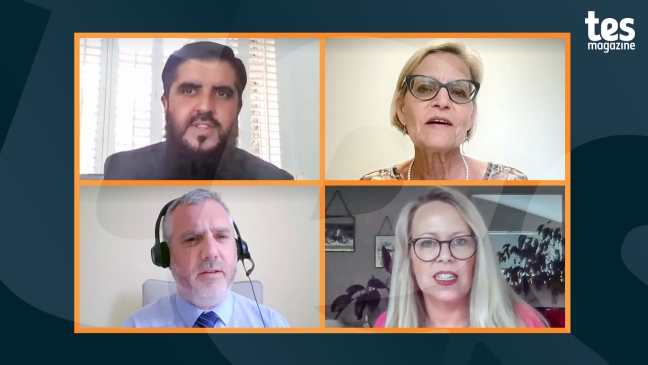- Home
- Leadership
- Strategy
- Should schools be spending more time marketing?
Should schools be spending more time marketing?

“Marketing schools is not like marketing a soap powder.”
This webinar takes a deep dive into the complex world of marketing, and how schools and trusts can use its power to attract parents and new teachers.
Our panel of experts are in agreement that marketing isn’t something that education settings should be afraid of - but they should try to steer clear of the possible pitfalls.
Joining Tes senior editor Dan Worth on the panel are:
- Sufian Sadiq, director talent and teaching school at Chiltern Learning Trust
- Michael Tidd, headteacher at East Preston Junior School, in West Sussex
- Agnes Nairn, professor of marketing in the School of Economics, Finance and Management at the University of Bristol, and the university’s pro vice-chancellor for global engagement
- Nicole McCartney, director of education at Creative Education Trust
You can watch the webinar and read a summary of the discussion below. If you can’t see the video, you can also watch it here.
Nairn sets the scene for the discussion by explaining that because education in England provides choice to parents, marketing is inherently involved in the landscape.
“As soon as you have choice, you have competition - [and] that will certainly mean you need to use marketing in order to be able to differentiate what you’ve got from other people,” she says.
Harnessing the power of marketing
But she acknowledges that “selling” education is not like marketing an everyday consumer product - like soap powder, as she is quoted as saying above - because there are so many different communities to serve that have to be considered in any marketing activities.
“It’s about understanding that you have different groups of stakeholders, and they will have different needs,” Nairn says.
“Marketing to get the right teachers, marketing to the community so that you have the support of your local people, [marketing] for pupils that are coming up, and marketing to parents.”
She adds that while this may sound like a lot of work for schools, good marketing that appeals to each group should be based on something that schools are usually good at: listening and understanding.
“Marketing isn’t just about communicating out. It’s much more about listening and providing the service that your stakeholders want,” she says.
The need for self-promotion
Sadiq says he understands that educators might be wary of proactively engaging in marketing because of its overtly capitalistic connotations - but he counters by saying that the sector has recognised the reality of marketing being part of schools’ strategies.
“I think there’s a dichotomy between the moral purpose of the profession that we’re in and people feeling like marketing is this evil, crude thing that exists within industry,” he says.
“But if you go back to basics, where you have a product or a service - and that’s what we provide - and you’ve got competing buyers and sellers, you end up in a market.”
What’s more, in the current recruitment climate, with teachers having a choice of schools to choose from, how a school or trust presents itself to a prospective new teacher is more important than ever.
“Ten, 15, 20 years ago, you would train the teacher to try to make themselves more recruitable, but the paradigm shifted and you now need to train schools on how to make themselves more attractive to the teacher because of the supply and demand issues,” Sadiq says.
Furthermore, given that most new teachers will be more than used to marketing in their lives through social media platforms, there needs to be an awareness of how to use it.
“They’re consuming marketing, more than we’ve ever seen generationally, in all aspects of their life, [and] marketing is a key driver in decision making,” says Sadiq.
“Therefore, for us to think that if we want to start recruiting teachers into schools, we need to separate the whole marketing element is a little naive. I think we’ve got to show why our school is better.”
The risk of false advertising
Offering the view of a frontline school leader, Tidd admits that the idea of marketing his school in a way that could somehow be seen as competition with others was, at first, an alien concept.
“I’m one of those heads who finds it really difficult to think I’m competing with other schools, particularly in my local area,” he says.
However, Tidd says the bigger picture is the school making sure that it is appealing to the right parents and staff, so there is a clear purpose to its marketing.
“Marketing [can feel] uncomfortable initially but, actually, what we’re trying to do is get the right partnership with the people. So, a lot of our marketing is focused on that, and perhaps less so on that bit that feels uncomfortable around competing with the colleagues next door,” he explains.
“People don’t always like the peacock feathers all the way out”
Tidd notes, though, that with falling pupil rolls, it could be tempting for schools to want to sell themselves in a way that will entice more parents and teachers - but he says that promoting something that you’re not really offering is a dangerous game to play.
“In one of the schools I worked at, one of my [science] class asked me, ‘When are we going to do that experiment on the [school] website where they’re pouring the red liquid into the blue liquid?’ I said, ‘I think that’s just something the photographer created.’ That’s where you have to be careful,” Tidd says.
“We’ve got music practice rooms and great peripatetic music teachers, but we haven’t had a guitar teacher for a while. So, the last thing we need to do is have a picture [on the school website] of a child holding a guitar as if that’s key to what we do. Because then somebody turns up and says, ‘Where’s the guitar lesson?’”
He warns that if parents feel the vision they were sold is not the reality, they are more likely to move their child out - something that is damaging for all involved.
“When there are spaces [in schools], people have got the freedom to move around, and people will, and having lots of churn, that’s really difficult for children and for families and for schools,” Tidd explains.
“I think the last thing you want to do is recruit people under false pretences…So, we need to accept that we need to be quite honest about where we think our strengths are.”
This is echoed by Nairn, who has recently researched how schools market themselves around the world, finding that in many instances schools want to promote themselves through flashy campaigns. But she says that, if this is not the reality, it will backfire.
“I think the big warning bell from our study was if you do jump into marketing and get carried away with promoting wonderful images, if it isn’t backed up by curricular change, or changes in staffing, it will backfire quite badly,” she says.
Be careful not to put parents off
McCartney adds that even if a school is honest in what it promotes, there is a fine line between positive promotion and showing off.
“People don’t always like the peacock feathers all the way out,” she says.
“A school should celebrate what it’s doing well…but at the same time, you do have to watch your tone. [You don’t want] to lift the threshold so far that that people can’t step in the building.”
She thinks this kind of over-the-top self-promotion happened in the early days of the academies movement, which should serve as a lesson. “Everybody had money, and the marketing was sort of outrageous to some degree, and it was all sort of slick and well-designed and actually, I think, that puts some parents off,” McCartney says.
She adds that for many schools and trusts, marketing will be less about showing off and instead rebuilding a brand and a place in a local community - something she has done many times working with schools joining trusts as sponsored academies.
“[The marketing] has been about recovering a position that is often a deficit position in the community, but also identity - creating some manner of identity out of something that perhaps has not had a good reputation in the local area for many years,” McCartney says.
Using marketing to create a community
Building a positive brand is not just important in terms of attracting new pupils or staff; it also creates a sense of pride among students, she explains.
“I think what people miss, often, is that marketing of a school’s place in a local community does affect the children and their pride in the school, and their sense of belonging in the school,” McCartney says.
“So I think there is a sort of social psychology in a local community that is affected by the marketing of a school and how that’s done.”
For this kind of marketing to be successful, though, she feels that trusts have to recognise that individual schools need the freedom to decide what it looks like - because they know their communities best. Trusts, however, can give their schools clear top-down values to act as a guide for their marketing plans.
“We make sure there are the golden threads of our values that run through the marketing programmes of each of our schools, so there is that sense of one-brand identity. But the local marketing really…speaks to the local community and whatever those needs are,” McCartney explains.
Nairn also raises the point that there is no regulation around advertising in education - but she can imagine that changing as the sector is likely to become more competitive in the years ahead.
“The committee of advertising practice has all sorts of codes of practice for marketing…but there’s nothing on the marketing of schools. I think it needs to come into play,” she says.
Watch the full webinar via the video link above. For more top tips on how to ensure that you create a marketing strategy that truly benefits your education setting, read this article co-authored by Professor Nairn and research colleagues
You need a Tes subscription to read this article
Subscribe now to read this article and get other subscriber-only content:
- Unlimited access to all Tes magazine content
- Exclusive subscriber-only stories
- Award-winning email newsletters
Already a subscriber? Log in
You need a subscription to read this article
Subscribe now to read this article and get other subscriber-only content, including:
- Unlimited access to all Tes magazine content
- Exclusive subscriber-only stories
- Award-winning email newsletters
topics in this article




